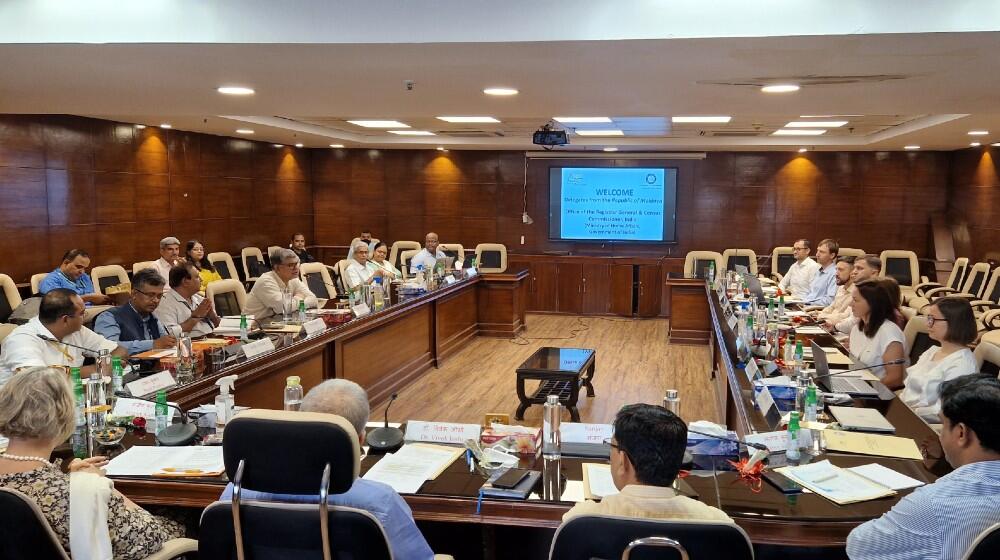A delegation of the Republic of Moldova, consisting of representatives of the National Bureau of Statistics (NBS), the Electronic Government Agency, the Ministry of Finance and the United Nations Population Fund of Moldova (UNFPA) undertook a study visit to India, New Delhi, during 01 – 05 August 2022.
The study visit facilitated by UNFPA aimed the exchange of experience and best practices between the competent authorities of the two countries regarding the organization and conduction of population and housing censuses, including the combined ones that use administrative data registers. The delegates had several bilateral meetings on these subjects.
The list of Indian institutions visited during the mission included the authorities responsible for keeping India's population register and conducting censuses (within the Ministry of Home Affairs), producing official statistics (Ministry of Statistics and Program Implementation), cooperative relations (Ministry of External Affairs), and the local office of UNFPA in India.
During the visit, the participants from the Republic of Moldova had the opportunity to learn about the good practices in conducting censuses of the host country, some of which can be taken over and implemented in the Republic of Moldova for the next population and housing census from 2024 inclusive:
- the use of geospatial technologies for the preparation and conduct of the population and housing census;
- testing the use of nationally available administrative sources for census purposes;
- the use of modern devices (such as tablets or mobile phones) in the collection of census information, with the installation of the application that ensures the protection of personal data;
- the use of digital software (such as the Census Monitoring System – census program application developed by Indian specialists) to monitor in real time the activity of reviewers in the field, the progress in the collection of census data and their preliminary analysis;
- the involvement of teaching staff from educational institutions (and other categories of specialists) as reviewers in order to ensure a sufficient number of temporary census personnel to collect data in the established terms and of the necessary quality (the number of reviewers in India being approx. three million, which would be more than the resident population of the Republic of Moldova).
The study visit to India was organized with the support of the United Nations Population Fund of Moldova, which, through the Demographic Resilience program, supports the strengthening of the data system in the Republic of Moldova, based on reliable data.
“This study visit represents the experience exchange between two developing countries, and as a result the working methodologies for the next census in the Republic of Moldova will be improved. In the next period, the National Bureau of Statistics will strengthen its capacities for the use of statistical data, through applying modern statistical methods based on the administrative data. UNFPA will continue to support the country in its efforts to strengthen demographic resilience, based on reliable data” emphasized Igor Condrat, UNFPA Moldova program officer.
Additionally, this study visit strengthened the South-South cooperation through the exchange of experience between countries: “Promoting South-South cooperation is important, as it represents, in my opinion, an excellent method that gives the chance to exchange knowledge and to identify the solutions and expertise necessary for the good organization of such large-scale processes and events”, added Igor Condrat.
Also, the members of the delegation got familiar with the history (over seven decades) of the organization of the census in India, being a country with long-term experience in conducting 10 censuses to date, the first census, organized according to the current definitions, being conducted in the 1948 year. Moreover, it was also discussed that the process of training the people involved in the census is a very complex one, the training and the information collection process being carried out in 19 languages.
At the same time, the NBS representatives of the National Bureau of Statistics shared their own experience of conducting censuses and developing the population statistical register. The Statistical Population Register being a component of the “Demographic and Social Statistics” Information System, the concept of which was approved in the 24 August 2022 Government session) for estimating of international migration and usual resident population in the period between censuses.
At the end of the study visit, the members of the Moldovan delegation, including representatives of the Ministry of Finance (as the national authority for coordinating external assistance), the Electronic Government Agency (responsible for the modernization and digitalization of public services) and the National Bureau of Statistics (as the central authority in the field of statistics) had a meeting with the Joint Secretary of the United Nations Economic & Social Division, Ministry of External Affairs of India, where they discussed possible future partnerships.
This study visit represents a South-South cooperation activity, through which the sharing of experience between two developing countries was achieved, and as a result possible solutions to overcome possible challenges in organizing a population and housing census were discussed and identified, analyzed the needs for expertise and strengthening of national capacities for the successful conduct of such a large-scale statistical research as the census.
We note that this study visit was organized with the support of the UN Population Fund under the project “Improving the availability of administrative data to track the progress of the ICPD agenda under the SDGs” funded by the India-UN Development Partnership Fund, through the United Nations Office for South-South Cooperation.
The activity is part of UNFPA's Demographic Resilience Program, which aims to support countries in the region in developing policies and programs aimed at the population, to respond to demographic changes, strengthen human capital and define a prosperous future.


